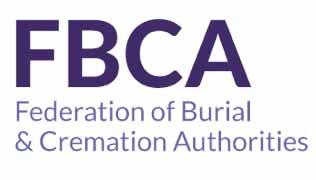
16 minute read
COVID 19 Guidance on Managing a Funeral – Updated 11 August 2020
This is national guidance. If local restrictions are in place in your area, check information on local restrictions (https://www.gov.uk/government/collections/local-restrictions-areas-with-an-outbreak-of-coronavirus-covid-19).
What has changed
Advertisement
This guidance has been updated in line with the Health Protection Regulations 2020 and The Health Protection (Coronavirus, Wearing of Face Coverings in a Relevant to limit risks around the transmission of the virus. Those
Place) (England) (Amendment) Regulations 2020
Changes include: •allowing both family and friends to attend a funeral •the number of people who can attend a funeral •allowing mourners to stay overnight outside their home •the safe management of the funeral venue •ensuring that those attending are reminded of the should also be within the capacity limits of the adhered to. In some cases that may be less than and Trace, but are not symptomatic themselves, risk of transmission others; remote participation should be considered to self-isolate (in the last 14 days) may attend the
•the change in requirement to self-isolate for 10 days (previously 7) for those with symptoms of COVID-19 •the requirement to wear face coverings in indoor places of worship, crematoria and burial ground chapels
This guidance is of a general nature and should be treated as a guide, and in the event of conflict between any applicable legislation (including the health and safety legislation) and this guidance, the applicable legislation shall prevail.
This guidance applies in England.
Main principles
This advice is designed to assist people who are involved in managing or organising a funeral related to a death from any cause during the coronavirus (COVID-19) pandemic.
This guidance has been developed to ensure that: •bereaved people are treated with sensitivity, dignity and respect •mourners and workers involved in the management of funerals are protected from avoidable risk of infection
Guidance for care of the deceased is available with further guidance and information on the NHS Test and Trace programme for employers, businesses and workers, as well as for the public.
This guidance remains under review and may be updated in line with the changing situation.
What you need to know
The following guidance aims to balance the needs of the bereaved to mourn appropriately while minimising the spread of COVID-19 infection. Communities, organisations and individuals are strongly advised to take action to reduce the risk of spreading COVID-19 their respects, with a particular focus on protecting people who are clinically vulnerable or clinical extremely vulnerable and more likely to develop severe illness.
When gathering to mourn, your main concern should be risks increase whenever households mix. A household means those people who usually live together under the same roof and share facilities with you. If you have family members who do not normally live with you they need to be treated as a separate household.
These actions include: •ensuring venue capacity and attendance numbers allow social distancing (at least 2 metres or 3 steps) to be maintained between individuals. See further detail under the section on management of the venue need to wear a face covering. See further detail under the section on social distancing for mourners •a modest number of close friends and family of the deceased may attend although funerals should have no more than 30 people in attendance. Attendance premises so that social distancing can be strictly 30 people. See further detail under the section on management of the venue •mourners who are self-isolating due to someone in their household or support bubble being unwell with symptoms of COVID-19 or as advised by NHS Test should be facilitated to attend the funeral in person should they wish to do so, with processes put in place to minimise the risk of transmission •mourners who are clinically vulnerable or clinically extremely vulnerable should also be facilitated to attend, with processes put in place to minimise the •any mourner who has COVID-19 symptoms (a new continuous cough, a high temperature, or a loss of, or change in, their normal sense of taste or smell) should not attend the funeral as they pose a risk to •mourners who have travelled to England from countries that are not exempt from the requirement infection among mourners who are gathered to pay
funeral •mourners should also follow the advice on social distancing when travelling to and from the funeral gathering. See the section on travelling to and from the funeral
Pre-funeral and post-funeral ceremonies may be held in line with the guidance on Staying alert and safe (social distancing). However, families may consider deferring a celebration or memorial service, until further social restrictions are lifted and at a time when attendance can take place safely.
For the position of what is lawful, you should refer specifically to the Regulations (see at the end of this guidance for details).
Further information is available in the Staying alert and safe (social distancing) guidance.
Background
There is an increased risk of transmission of COVID-19 where families and communities come together following the death of a loved one, from any cause. While recognising the importance of these rituals and gatherings, it is strongly advised that the actions detailed in this guidance are taken to reduce the spread of infection, particularly to clinically vulnerable and clinically extremely vulnerable people who are at risk of severe illness.
For deaths that are suspected or confirmed as being due to COVID-19, it is recognised that household members of the deceased person may have already been exposed to COVID-19 during the course of the preceding illness. However, steps should be taken to minimise any new exposure, especially where individuals who are not part of the household and those at risk of severe illness may come into contact with the virus.
The government has advised that funeral services should continue and has requested that local authorities consider how they can facilitate this.
Funerals with physical attendance of mourners should continue but it remains important that those attending adhere to this guidance and the Regulations.
To ensure that organisations managing funerals are able to facilitate the needs and wishes of families, it is important that funerals are not delayed. We understand how difficult funeral arrangements will be for families and friends of lost loved ones, however, the current guidance will remain in place for the foreseeable future as we continue to respond to the challenges of COVID-19.
Who can attend?
The grieving process and related formal and informal rituals through which we mourn the passing of loved ones are important for the health and wellbeing of the bereaved. Interruption of this process is linked with negative impacts on both the physical and mental health of the bereaved.
It is advised only a modest number of family and friends of the deceased should travel to and attend the funeral. Overnight stays away from the home are also permitted, though it is advised this should only be with your own household or support bubble, or with members of one other household (in which case social distancing should be maintained).
Mourners coming from outside England
Mourners coming into England who have travelled to England from countries that are not exempt from the requirement to self-isolate (within the last 14 days) are required to self-isolate for 14 days from the day they were last in a non-exempt country. However, such mourners can leave their place of self-isolation in limited circumstances including on compassionate grounds. This includes attending a funeral.
The mourner can only leave their place of self-isolation when attending the funeral and is otherwise expected to self-isolate for the remainder of the 14-day period unless another exemption applies.
Mourners who are symptomatic
Anyone showing symptoms of COVID-19 (a new continuous cough, a high temperature or a loss of, or change in, their normal sense of taste or smell) should not attend the funeral due to the risk that they pose to others; remote participation should be considered, for example, via live streaming.
Anyone showing symptoms of COVID-19 should immediately self-isolate at home for at least 10 days and request a test online, or by contacting NHS 119 via telephone if they do not have internet access.
Mourners who are self-isolating due to a possible case of COVID-19 in their household
Mourners of the deceased person may include those who are self-isolating due to another member of the household or support bubble being unwell with symptoms of COVID-19 or as advised by NHS Test and Trace. Where the funeral is scheduled before the period of household or support bubble isolation has been completed (14 days from when the first person in that household or support bubble started showing symptoms) mourners who are self-isolating should be facilitated to attend.
Mourners who are from a household or support bubble that is self-isolating should: •not attend if they have any symptoms of COVID-19, even if these are very mild •maintain a distance of at least 2 metres (3 steps) between themselves and others. •advise the other mourners that they are otherwise still within the 14-day isolation period, and ensure that they do not attend at the same time as another mourner who may be clinically vulnerable or clinically extremely vulnerable •only break self-isolation when attending the funeral and otherwise continue to self-isolate •practise strict hand and respiratory hygiene: •wash their hands more often than usual with soap and water for at least 20 seconds, or use a hand sanitiser •avoid touching their eyes, nose, and mouth •cover their coughs or sneezes. Guidance for households with possible coronavirus infection is available
Mourners who are from a household or support bubble that is self-isolating must wear a face covering by law when attending indoor places of worship, crematoria and burial ground chapels unless exempt for health, disability or other reasons.
Mourners who are clinically extremely vulnerable
People who are clinically extremely vulnerable should have received a letter telling them they are in this group or been told by their GP. Mourners who are clinically extremely vulnerable should be facilitated to attend, should they wish to do so, but have been advised that they should minimise their contact with people outside their household or support bubble for their personal protection.
While shielding advice remains in place they are advised not to attend at the same time as mourners who are otherwise self-isolating due to being household or support bubble or non-household contacts of a case, as they could be incubating disease.
Mourners who are clinically extremely vulnerable should maintain strict social distancing and follow the latest guidance available.
Actions to reduce their risk of infection could include: •advising other attendees that there is a clinically extremely vulnerable person attending and reiterating the need to stay at home if they are unwell with symptoms of COVID-19, and to be respectful of the vulnerable person’s need to avoid close contact at any point •advising the mourner to travel to the venue via the safest route possible, preferably in a car by themselves, or with someone from their household or support bubble •considering the additional risk involved if attending the funeral requires travelling by public transport
Mourners who are clinically vulnerable or clinically extremely vulnerable should adhere to rigorous hand and respiratory hygiene measures at all times, but particularly while out of the home environment. Hand sanitiser or sanitising wipes should be used regularly while outside of the home. A face covering must be worn by law when in indoor places of worship, crematoria and burial ground chapels unless exempt for health, disability or other reasons.
Further information is available in the guidance on shielding and protecting people who are clinically extremely vulnerable from COVID-19.
Participation without attendance
Additional measures that allow participation in the funeral service without attendance should be considered, such as: •allowing additional mourners to participate remotely alongside those physically present, for example, by live-streaming the service. Priority should be given to mourners who are clinically extremely vulnerable •while pre-funeral or post-funeral ceremonies may be held in line with the guidance on Staying alert and safe (social distancing), families may consider deferring a celebration or memorial service until further social measures are relaxed and at a time when attendance can take place safely
Social distancing for mourners
Social distancing measures reduce the transmission of COVID-19 and include: •ensuring at least 2 metres (3 steps) away from others •following the guidance on hand hygiene and preventing the spread of infection: •washing one’s hands more often than usual, for 20 seconds using soap and water or hand sanitiser, particularly after coughing, sneezing and blowing one’s nose, or after being in public areas •when coughing or sneezing, cover the mouth and nose with a tissue and throw the tissue away immediately, or in the absence of a tissue, use the crook of one’s elbow (not hands) to cough or sneeze into. Then wash both hands or use hand sanitiser •face coverings must be worn by law in indoor places of worship, crematoria and burial ground chapels unless exempt for health, disability or other reasons. Face coverings should also be worn in other enclosed public spaces where social distancing may be difficult and where you come into contact with people you do not normally meet. There is additional guidance on the use of face coverings
Travelling to and from a funeral
Mourners should also follow the advice on social distancing when travelling to and from the funeral. Wherever possible, mourners should travel to the venue in a car by themselves or with people from their household or support bubble (if applicable). If this is not possible and funeral transport is required: •the number of people in each car should be kept as low as possible •there should be good ventilation (keep the windows open) •if possible, maintain social distance between passengers, maximising the distance through appropriate seating positions •mourners who are not from the same household or support bubble should face away from each other •vehicles should be cleaned regularly using gloves and standard cleaning products with particular emphasis on handles and other surfaces that passengers may touch •the driver and passengers should wash their hands with soap and water for at least 20 seconds before and after the journey or use hand sanitiser. They should cover their mouth and nose with disposable tissues when coughing or sneezing or with the crook of their elbow if no tissues are available •they should avoid touching their faces and dispose of used tissues in a bin immediately
If mourners are using shared transport with others that they do not normally meet and where social distancing is not possible, they should consider wearing a face covering. If public transport is necessary, mourners are advised that wearing a face covering is mandatory on
There is additional guidance on the use of face coverings.
Management of the venue
There remains an increased risk of transmission of coronavirus (COVID-19) where families and communities come together following the death of a loved one, from any cause. While recognising the importance of these rituals and gatherings, it is strongly advised, in order to stay safe, that numbers of mourners in physical attendance are kept to a modest number.
Those organising a funeral should adhere to the following: •ensuring venue capacity and attendance numbers allow at least 2 metres (3 steps) to be maintained between individuals •the size and circumstance of the venue will determine the maximum number that can be accommodated while also facilitating social distancing, but numbers should be minimised. Venues will need to consider how best to manage this, including through use of remote live-streaming, where possible. Attendees should be enabled to follow the guidance on staying alert and safe •it is advised that the number of attendees should be restricted to a maximum of 30 persons for public health reasons •the Regulations set out a maximum 30 people limit in respect of private homes, including gardens •venues that are able to follow COVID-19 Secure guidelines may host larger groups. Separate guidance on places of worship is available •this is also the case for events in public outdoor spaces that are organised by businesses, charitable or political organisations, and public bodies, provided they take reasonable steps to mitigate the risk of transmission, in line with COVID-19 Secure guidance and including completion of a risk assessment. Any other gathering in an outdoor space must not be any larger than 30 people •if there is limited capacity for remote access, priority should be given to mourners who are clinically extremely vulnerable •activities such as singing, chanting, requiring raised voices or playing of instruments that are blown into should be specifically avoided. This is because these activities pose a possible additional risk of infection even if social distancing is being observed or face coverings are used •remind mourners that face coverings must be worn in indoor places of worship, crematoria and burial ground chapels. There is additional guidance on the use of face coverings. Please be mindful that there are valid exemptions for some individuals and groups to not wear a face covering in these settings or to remove it, for example if a mourner becomes distressed. Venue managers should treat such necessary actions with sympathy and understanding •venues should ensure that steps are taken to avoid activities needing or causing people to project their voices loudly. This includes – but is not limited to –
refraining from playing music or broadcasts that may encourage raised voices, including if played at a volume that makes normal conversation difficult •venues should communicate and encourage compliance with limits on gatherings, for example, on arrival or at booking. Mourners who attend should be signposted to the advice on social distancing and informed that they should not attend the funeral if they are unwell with symptoms of COVID-19 •venue managers should ensure that handwashing facilities with soap and water or hand sanitiser are available and clearly signposted. Venue toilets should be kept open and carefully managed to reduce the risk of transmission of COVID-19. This may include: •using signs and posters to build awareness of good hygiene and social distancing practices •limited entry approaches while not creating additional bottlenecks •setting up and monitoring more frequent cleaning schedules including waste management and collection •venue managers should ensure that processes are in place to allow suitable time for cleaning and disinfecting the area in which the service takes place, both before and after each service, paying attention to frequently-touched objects and surfaces, using regular cleaning products •venue managers should maximise ventilation rates of the premises by opening windows and doors where possible •venue managers should consider how to manage the flow of groups in and out of their venues to minimise overlap between different groups and allow for adequate cleaning •venues should consider the cumulative impact of movement on public transport and in public spaces.
This means consideration of further mitigation including advising mourners to avoid particular forms of transport, routes or crowded areas in transit to the venue •employers should assess the use of face coverings at work on a case by case basis depending on the workplace environment, other appropriate mitigations they have put in place, and whether reasonable exemptions apply. Staff should follow guidance from their employer based on a workplace health and safety assessment. Public health advice is that staff should wear a face covering in enclosed public spaces where social distancing may be difficult and where they come into contact with people they do not normally meet
•venue managers can also enter into a suitable arrangement with others carrying out services in their venue, eg funeral directors, and those leading or reading at a funeral service, ensuring that mitigations are in place and actions are taken as appropriate to the venue and detailed above
Venues are requested to keep a temporary record of staff shift patterns and visitors for 21 days, in a way that is manageable for the business, and assist NHS Test and Trace with requests for that data if needed. This could help to contain outbreaks of infection.









